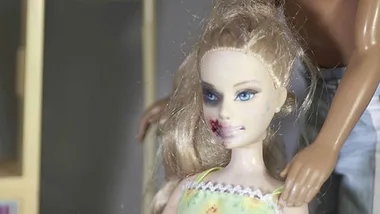Can a man be considered brave if he beats his wife? I wouldn’t have thought so, but the Royal Humane Society of Australasia has a different view.
Last month the Society, of which the Governor-General is a patron, gave bravery awards to heroes of the Black Saturday bushfires.
On the merit certificate list was Paul Francis McCuskey, who, a year after the fires, pleaded guilty to brutal attacks on his wife.
These included kicking her in the stomach while she was pregnant and kicking and hitting her in the head so badly it left her permanently blind in one eye.
In 2009, McCuskey was among a group of fire fighters who braved treacherous conditions to visit an elderly woman living alone to encourage her to leave.
As they were driving back, they had to use handsaws to clear burning trees from their path. Each member of the cohort has been recognised by the society for his or her bravery that night.
McCuskey, 41, of Reefton, couldn’t accept the award from the Victorian governor because he was in prison.
In 2010 he was sentenced to five-and-a-half years in jail for assaulting his former partner over eight months in 2006 and 2007.
The judge cited his contribution to the Country Fire Authority as a redeeming feature, and acknowledged his remorse, but said his crimes were carried out in a brutal and cruel way.
The jail sentence was partly intended to send a clear message to the community that such violent behaviour would not be tolerated.
When McCuskey’s award was first questioned by the Australian Women’s Weekly the Royal Humane Society president said the organisation was not aware of his criminal history. Last week a review committee decided the award should stand.
The main criterion of the society is to bestow bravery awards on those who risk their lives to save the lives of others, a society spokeswoman said.
“It has never been the role of the Society to judge award nominees on their probity either prior to or after their act of bravery.”
McCuskey’s victim did not comment, but is believed to be extremely upset. So are other firefighters from the unit.
His former commander, CFA captain Dan Bennett says: “As far as we are concerned, he is a scumbag and he’s where he deserves to be. What we’re disappointed in (is) that it’s taken the shine off the award for the rest of the crew.”
If we’re honest, most of us can be both brave and cowardly. But McCuskey’s actions went beyond cowardly.
He assaulted someone more vulnerable than him, someone unable to fight back, and someone he professed to love.
He hit her, dragged her from a car and kicked her in her pregnant belly (she later miscarried). He has left her, in her words, embarrassed, ashamed and fearful of going out in public alone. Not to mention blind in one eye.
When you weigh McCuskey’s lone act of bravery against his many of cowardice there is little ambiguity. He is a coward.
The decision suggests the Humane Society is not taking his crime as seriously as it should, especially as its gold medal for bravery went to a man who was stabbed eight times while saving two women from domestic violence.
I wonder whether McCuskey’s citation would have been upheld if he’d been convicted of paedophilia or murder.
Domestic violence is at epidemic proportions. A woman is killed in Australia almost every week by a partner or former partner. A third of women who have had a male partner have experienced violence.
But Australians still don’t take domestic violence seriously enough and the Royal Humane Society’s decision to uphold the certificate of merit only confirms this.
Domestic violence will never be treated with the gravity it deserves until this mask of respectability is torn off, and the men who perpetrate it are treated like low-life criminals rather than upstanding citizens with a tragic flaw.
Awarding a bravery award to Paul McCuskey insults his victim, every other victim of domestic violence in Australia, and the firefighters who deserve to enjoy their bravery award without the taint of McCuskey’s cowardice.
Jordan Baker is news editor at The Australian Women’s Weekly.

.jpg?resize=380%2C285)

